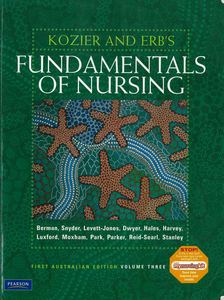Loss, grieving and death
Baldwin, Adele (2010) Loss, grieving and death. In: Berman, Audrey, Snyder, Shirlee J., Kozier, Barbara, Erb, Glenora, Levett-Jones, Tracy, Dwyer, Trudy, Hales, Majella, Harvey, Nichole, Luxford, Yoni, Moxham, Lorna, Park, Tanya, Parker, Barbara, Reid-Searl, Kerry, and Stanley, David, (eds.) Kozier and Erb's Fundamentals of Nursing. Pearson Australia, Frenchs Forest, NSW, Australia, pp. 1139-1162.
![[img]](https://researchonline.jcu.edu.au/16212/1.hassmallThumbnailVersion/16212_Baldwin_2010_Book_Cover.jpg)
|
Image (JPEG) (Book Cover)
- Cover Image
Download (2MB) |
|
|
PDF (Published Version)
- Published Version
Restricted to Repository staff only |
Abstract
For years Kozier & Erb’s Fundamentals of Nursing has been the gold standard in helping students embarking on their nursing careers. This first Australian edition retains many of the features that have made this textbook the number-one choice of nursing students and lecturers.
To further enhance this popular fundamentals textbook and ensure its appropriate application for Australian students, nursing academics from across Australia were invited to review and comment on each of the 52 chapters. Their detailed feedback has ensured that Kozier & Erb’s Fundamentals of Nursing: First Australian Edition is a current, engaging and uniquely Australian textbook that will help students succeed in their nursing studies.
Kozier and Erb’s Fundamentals of Nursing, First Australian Edition presents the fundamentals of nursing care within the framework of the nursing process. This text offers an accessible writing style; a focus on practical application with real-world Australian examples and case studies; appropriate Australian terminology, policies and procedures, Australian visuals; an integrated approach to Australian Indigenous health issues; and up-to-date references, research and codes of practice, with reference to ANMC guidelines. The text is supported by a state-of-the art technology package to enhance the learning process.
Chapter 43: Everyone experiences loss, grieving and death at some time during his or her life. People may suffer the loss of valued relationships through life changes, such as moving from one city to another, separation, divorce or the death of a parent, spouse or friend. People may grieve changing life roles as they watch grown children leave home or they retire from their lifelong work. The loss of valued material objects through theft or natural disaster can evoke feelings of grief and loss. When people's lives are affected by civil or national strife, they may grieve the loss of valued ideals such as safety, freedom or democracy. In the clinical setting, the nurse encounters clients who may be experiencing grief related to declining health, loss of a body part, terminal illness, or the impending death of self or a significant other. The nurse may also work with clients in community settings who are grieving losses related to personal crisis (e.g. divorce, separation) or disaster (bushfires or cyclones). Therefore, it is important for the nurse to understand the significance of loss and develop the ability to assist clients as they work through the grieving process. Nurses may interact with dying clients and their families or caregivers in a variety of settings, from a foetal demise (death of an unborn child), to the adolescent victim of an accident, to the elderly client who finally succumbs to a chronic illness. Nurses must recognise the various influences on the dying process - legal, ethical, religious and spiritual, biologic, personal- and be prepared to provide sensitive, skilled and supportive care to all those affected.
LEARNING OUTCOMES - Describe types and sources of losses. - Discuss selected frameworks for identifying stages of grieving. - Identify clinical symptoms of grief. - Discuss factors affecting a grief response. - Identify measures that facilitate the grieving process. - List clinical signs of impending and actual death. - Describe helping clients die with dignity. - Describe the role of the nurse in working with families or caregivers of dying clients. - Describe nursing measures for care of the body after death.
| Item ID: | 16212 |
|---|---|
| Item Type: | Book Chapter (Teaching Material) |
| ISBN: | 978-1-4425-0471-4 |
| Keywords: | actual loss, algor mortis, anticipatory grief, anticipatory loss, bereavement, cerebral death, closed awareness, complicated grief, end-of-life care, grief, heart-lung death, higher brain death, hospice, livor mortis, loss, mortician, mourning, mutual pretence, open awareness, palliative care, perceived loss, rigor mortis, shroud, undertaker |
| Date Deposited: | 27 Apr 2011 01:30 |
| FoR Codes: | 11 MEDICAL AND HEALTH SCIENCES > 1110 Nursing > 111099 Nursing not elsewhere classified @ 100% |
| SEO Codes: | 92 HEALTH > 9202 Health and Support Services > 920210 Nursing @ 100% |
| Downloads: |
Total: 295 Last 12 Months: 7 |
| More Statistics |



